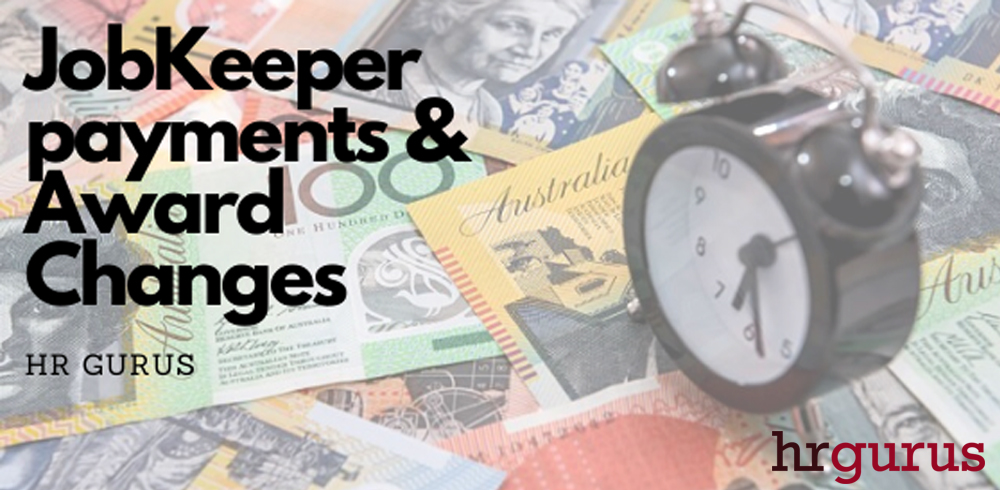JobKeeper and Award changes explained

Yesterday the Government announced a new JobKeeper program designed to pay or supplement Australian workers a flat rate of $1,500 per fortnight.
There will be a lot of questions about how this works from employees and how to access this assistance.
Furthermore, there have been temporary amendments made to both the Clerks and Private Sector Award and the Hospitality Industry Award in relation to reducing employees’ hours and directing them to take annual leave.
We will explain below the new changes in order to provide as much clarity as possible but please understand this situation is evolving and changing daily.
- What is the Government JobKeeper program?
In an attempt to keep the economy going through the pandemic, the Government last night announced a new program whereby workers will have their wages paid up to the value of $1,500 per fortnight. The payments will cover a 6-month period from 30 March 2020, with the first payment in May to be backdated.
The key points are:
- Eligible businesses will receive $1,500 per fortnight per employee.
- Businesses with a turnover of less than $1 billion will need to have a revenue drop of 30% to be eligible (relative to comparable period a year ago)
- Businesses with a turnover of more than $1 billion will need to have a revenue drop of 50% (relative to comparable period a year ago)
- The payment applies to full-timers, part-timers and casuals (who have been with their employers for more than a year) if they were with their organisation on 1st March 2020
- Employees who are kept on the books, even if they are stood down will receive this pay
- Employees who have already been let go, can be reinstated and put back on the books and receive the payment
- Employers need to sign up for the program, you can register your interest here
- Employers will need to identify eligible employees for JobKeeper Payments and must provide monthly updates to the ATO.
- Employers are required to advise their employees that they have nominated them as eligible employees to receive the payment.
- Superannuation on any additional wage paid because of the JobKeeper Payment is optional.
The money will be expected to reach employers from 1st May 2020.
- What if my employees earn more than $1,500 a fortnight?
The aim is for employees to keep receiving their current wage. The idea is that the first $1500 would be paid by the JobKeeper payment and the employer would be able to keep paying their employee, so they can continue to retain providing services and resume business on the other side of this pandemic.
- What if my employees have already accessed JobSeeker payments?
If your employees have already started receiving income support payments like the JobSeeker Payment when they receive the JobKeeper Payment, they will need to advise Services Australia of their new income.
For more information on the JobKeeper Program, you can access this fact sheet released by the government.
- What are the new changes to the Awards?
In response to the COVID-19 pandemic, two Awards so far have introduced changes around reducing hours and directing employees to take annual leave.
These are:
Most Awards do not allow employers to direct employees to take leave unless in the case of a shutdown or reduce hours, however, these are options that a lot of businesses are having to consider to keep their employees in jobs and their businesses ticking over.
The award changes allow employers to temporarily reduce full time and part-time employees ordinary hours by 40% (Hospitality Award) and 25% (Clerks Award).
The changes also allow employers to direct employees to take annual leave with 24 hours’ notice in hospitality and the ability to direct clerical workers to take annual leave with one week’s notice.
The Awards also allows for employees to agree to take up to twice as much annual leave at a reduced rate for any agreed or directed period away from work, including any close-down.
The changes also introduce flexibility around the range of duties that employees can perform regardless of their classification, as long as it is within their skill and competency and the duties are safe.
While these arrangements are in place, employees will continue to accrue entitlements as per usual even if their working hours are reduced and unpaid leave taken during a close-down will count as service.
The Clerks and Private Sector Award have also introduced changes around working from home, whereby the minimum shift time has decreased from 3 hours to 2 hours and the span of ordinary hours has been increased to cover 6am-11pm Monday to Friday and 7am-12:30pm on Saturdays.
These new changes are in line with what businesses need right now in the face of the COVID19 pandemic and subsequent economic downturn and we hope and anticipate more Awards will follow suit in the coming days…watch this space.
As always, we are here to support you through this. If you need any guidance on the above or other HR matters affecting your business, please reach out to HR Gurus.
Written by Jessy Warn, Managing Partner HR Gurus.

If you have any finance related queries
Book a Consultation
When’s good for you?